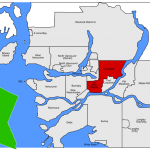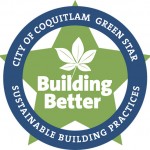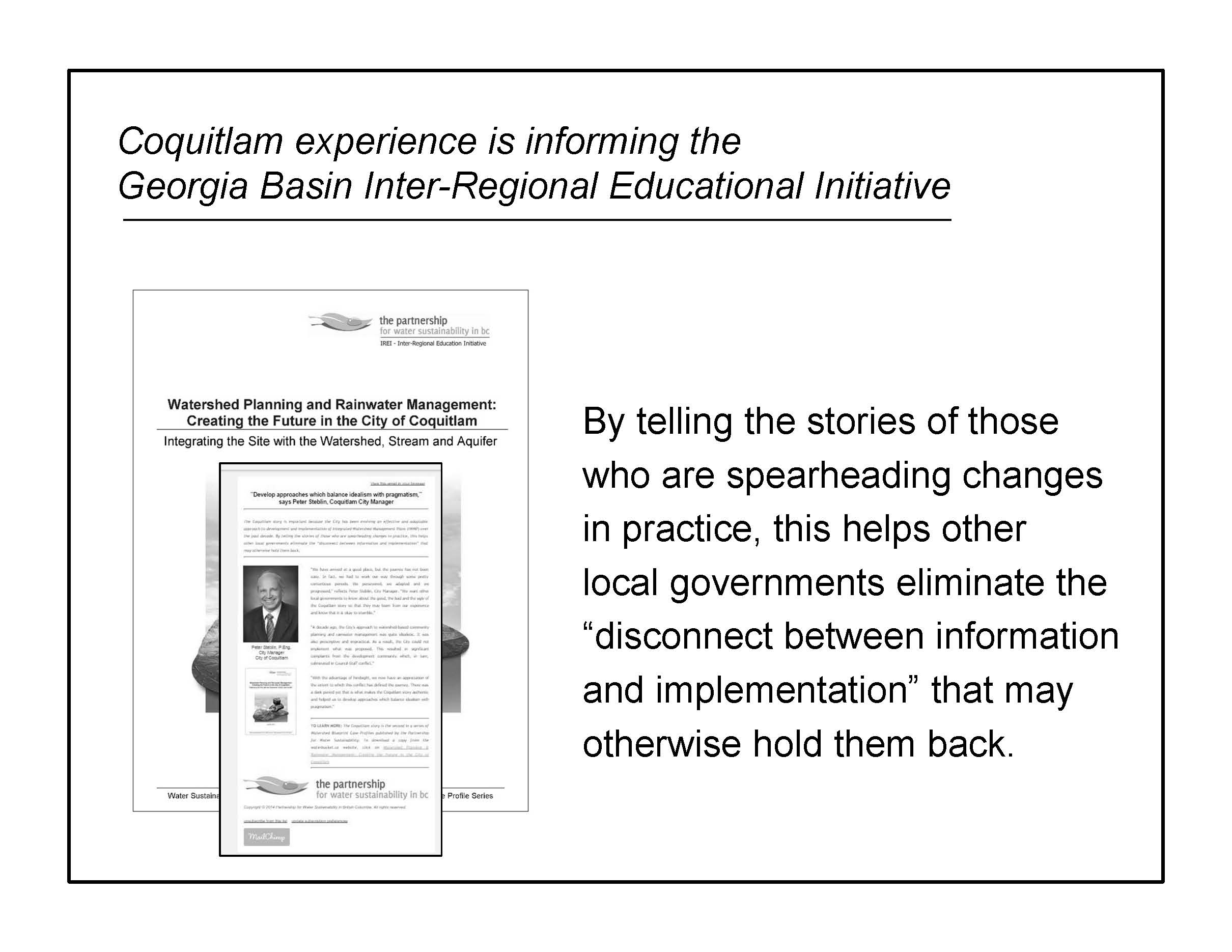FLASHBACK TO 2014: Partnership for Water Sustainability in BC recognized City of Coquitlam as a Champion Supporter and celebrated the accomplishments of staff
Note to Reader:
The Champion Supporter category of membership is the way in which the Partnership for Water Sustainability formally recognizes agencies and organizations that are playing a leadership role in assisting the Partnership with implementation of the Water Sustainability Action Plan for British Columbia.
On October 6, 2014 the Partnership’s Executive Director (Kim Stephens) presented Mayor and Council of the City of Coquitlam with a framed “letter of recognition” because the City is a leader by example in the Metro Vancouver region.
About the City of Coquitlam
Coquitlam is the sixth-largest city in the province and is one of the 21 municipalities comprising Metro Vancouver. The population, as of the 2011 Census, was approximately 126,000.
 Coquitlam is situated some 10 to 15 km (6.2 to 9.3 mi) east of Vancouver, where the Coquitlam River connects with the Fraser River and extends northeast along the Pitt River toward the Coquitlam and Pitt lakes. Coquitlam borders the cities of Burnaby and Port Moody to the west, the city of New Westminster to the southwest, and city of Port Coquitlam to the southeast. Burke Mountain, Eagle Ridge, and Coquitlam Mountain form the northern boundary of the city.
Coquitlam is situated some 10 to 15 km (6.2 to 9.3 mi) east of Vancouver, where the Coquitlam River connects with the Fraser River and extends northeast along the Pitt River toward the Coquitlam and Pitt lakes. Coquitlam borders the cities of Burnaby and Port Moody to the west, the city of New Westminster to the southwest, and city of Port Coquitlam to the southeast. Burke Mountain, Eagle Ridge, and Coquitlam Mountain form the northern boundary of the city.

Skyscrapers in the Town Centre area of the city of Coquitlam, with the North Shore Mountains in the background. (photo credit: Greg Salter)
Watershed-Based Community Planning
“In 2002, Metro Vancouver and local governments had generally embraced the concept of watershed-based community planning, but none had yet developed a solid mechanism for rolling out watershed-based approaches and processes,” states Melony Burton, City of Coquitlam Watershed & Drainage Coordinator.
“In May 2003, Coquitlam Council amended the City’s Official Community Plan (OCP). The new policies required that Neighbourhood Plans take into account watershed conditions and needs. This meant that Integrated Watershed Management Plan (IWMP) objectives would be realized through Neighbourhood Plan policies.”
Integrated Watershed Management Plans
“A decade ago, the new language and direction in the Official Community Plan provided City staff with the mandate to turn ideas into action,” continues Dana Soong, Coquitlam’s Utility Programs Manager.
“First and foremost, we were able to include the development of Integrated Watershed Management Plans (IWMPs) in the City’s Financial Plan. This funding assurance meant we could complete all IWMPs by 2014 as per the legislative direction.”
“Secondly, linking the IWMP and neighbourhood planning processes gave our Planning and Development Department and other departments a vested interest in the outcome of watershed plans and a reason to become active participants in the process.”
“Thirdly, the OCP supported new approaches to rainwater management in order to mitigate the impacts of land development. This laid the foundation for source controls in the Hyde Creek IMWP and later on for the city-wide Rainwater Management Design Requirements and Guidelines we use today.”
City of Coquitlam is a Champion Supporter of the Partnership for Water Sustainability
“The Partnership for Water Sustainability in BC is pleased to recognize the City of Coquitlam as a Champion Supporter,” stated Kim Stephens, Partnership Executive Director, when he presented Mayor Richard Stewart and Council with a framed letter of recognition. “The City’s long-term commitment is helping the Partnership advance the vision for achieving watershed sustainability through implementation of green infrastructure policies and practices.” 
Presentation of the “letter of recognition” to Mayor and Council provided the opportunity to celebrate the accomplishments of City staff, in particular Melony Burton who is a champion for environmental stewardship. Earlier that same day, she had briefed Council about the City’s Building Better Campaign. The goal is to increase public awareness around the city’s green infrastructure projects.
“We want to help the public identify these features and understand how they work,” said Melony Burton. She developed the Building Better Campaign as part of the City’s leadership program.
A Leader By Example
“The City of Coquitlam is a founding member of the Partnership. Our genesis goes back to 2002,” Kim Stephens informed Council. “Our mission is to develop tools, develop talent and focus on outcomes. A key part of being able to focus on outcomes is that local governments such as yourselves are the ones producing those outcomes. Articles about the City of Coquitlam are featured prominently on the waterbucket.ca website.”
 “A key message is that local governments learn from each other and they progress through sharing of case study experience. You have had a lot of case study experience over the last 15 years. People have been watching you. They have learned from your experience. And we have captured that in the (Watershed Case Profile Series) document that we released in January 2014.”
“A key message is that local governments learn from each other and they progress through sharing of case study experience. You have had a lot of case study experience over the last 15 years. People have been watching you. They have learned from your experience. And we have captured that in the (Watershed Case Profile Series) document that we released in January 2014.”
Watershed Planning & Rainwater Management: Creating the Future in the City of Coquitlam
“On behalf of Council, we thank you very much for this recognition of the City as a Champion Supporter of the Partnership,” stated Mayor Richard Stewart. “There is no  question that all of Council relishes that recognition. We strive to make sure that our watersheds work properly. We have a number of committees that are aimed at improving the health of the watershed and the health of the river – everything from sand and gravel operations to the discussion that we (Council) had earlier today related to the way in which stormwater management takes place adjacent to city streets, the kinds of initiatives we have undertaken and continue to undertake.”
question that all of Council relishes that recognition. We strive to make sure that our watersheds work properly. We have a number of committees that are aimed at improving the health of the watershed and the health of the river – everything from sand and gravel operations to the discussion that we (Council) had earlier today related to the way in which stormwater management takes place adjacent to city streets, the kinds of initiatives we have undertaken and continue to undertake.”
Balance Idealism with Pragmatism
“I just want to thank Kim for his work in capturing our words,” noted Peter Steblin, City Manager. “In the last few years we came to the recognition that our first attempt at achieving this was not implementable. We had to go back and revise some things. In his article, Kim really captured the struggles that we had between idealism and actual practical realities when you try to do watershed planning and development on the side of a mountain.”
 “We had to admit, and we did admit, that we didn’t get it right the first time. But we persevered, we changed our approach, and I think we got it much closer. We are still learning. I think we are a model. Many other communities were encouraged when we went public with statements that it is not always how easy it seems in the models. We hit some real challenges, we revised our approach, and Kim did a really good job of capturing that story. We thank him for that.”
“We had to admit, and we did admit, that we didn’t get it right the first time. But we persevered, we changed our approach, and I think we got it much closer. We are still learning. I think we are a model. Many other communities were encouraged when we went public with statements that it is not always how easy it seems in the models. We hit some real challenges, we revised our approach, and Kim did a really good job of capturing that story. We thank him for that.”
TO LEARN MORE:
To view the video of Kim Stephens presenting the framed “letter of recognition” to Mayor and Council at their, follow these instructions:
- Go to “Archived Meetings”: http://www.coquitlam.ca/city-hall/mayor-and-council/Watch-Council-Meetings.aspx
- Select Regular Meeting on October 6, 2014
- Then click on Item 1 – Presentation – Partnership for Water Sustainability in British Columbia (7:41 minutes).
To download a copy of the accompanying PowerPoint presentation by Kim Stephens, click on Rainwater Management in a Watershed Sustainability Context: The City of Coquitlam is a Leader by Example (2.3 MB).
To download a PDF copy of Coquitlam’s story, click on Watershed Planning & Rainwater Management: Creating the Future in the City of Coquitlam.

Front Row: Councillor Bonita Zarrillo, Councillor Lou Sekora, Mayor Richard Stewart, Councillor Mae Reid, Councillor Terry O’Neill
Back Row: Councillor Chris Wilson, Councillor Brent Asmundson, Councillor Craig Hodge, Councillor Neal Nicholson




